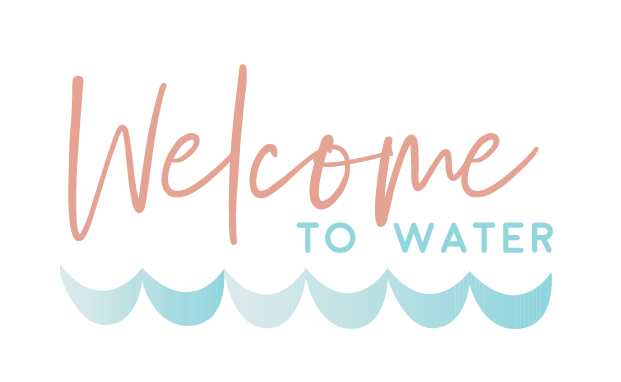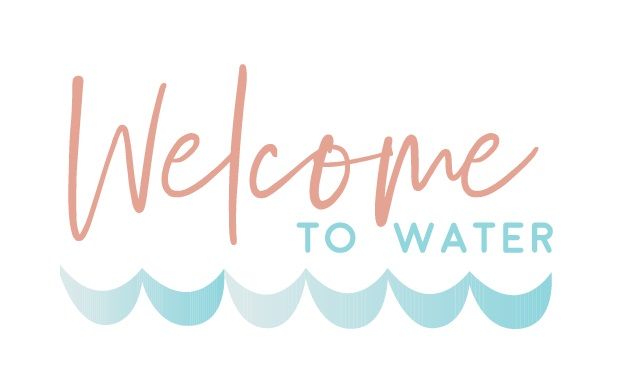Bath time with your 9 month old
Jessie Jones
At this age your baby is physically abounding with energy, she is mobile and constantly moving. Her gross motor skills like crawling, standing without support, squatting up and down and cruising are being mastered at every opportunity including her swimming classes and bath time. She’s also developing her pincer grasp, bringing her thumb and index finger together to pick up food and toys.
The last few months of babyhood are here and as much as you try and soak it all up it just feels like it fly’s by all too quick doesn’t it. Enjoy playing, singing and chatting to your baby at swimming lessons and throughout your days together and watch as she masters some big milestones this month both in the water and on land.
Her communication skills are growing each day, if she hasn’t already this might be the month she starts to shake her head ‘no’, wave bye-bye and point at things she wants. By now she is responding to her name or looking up when she hears it, she’s making sounds like 'Ma' and 'Da' that resemble words. This new found communication will begin to show in her swimming lessons too, meaning she can let you know more easily if she is enjoying an activity or if she has had enough or that maybe she doesn’t want to do the activity at all today. This is completely normal and shows good cognitive development, communication skills and independence. Try not to get frustrated if she doesn’t want to do something she normally loves, move onto another activity, modify it or try again another day. Remember to keep swimming a fun and enjoyable activity where you respect her feelings and respond to her communication cues and body language.
Her personality and emotions are really starting to show too, this month will give you a good insight into what sort of personality traits your little one might develop by showing signs of resilience, determination, joy and independence. Creating space and time for her in the pool and bath to try things independently first before doing it for her are very beneficial for her development during this age, it helps her to foster a sense of achievement and mastery. Follow her lead with pool and bath activities and encourage her with new and developing skills by demonstrating the skill yourself and letting her copy you as well as smiling, interacting with her and making it fun and playful.
At this age a child emotionally will have a growth spurt of self confidence as a result of their abilities to move about and master their environment but may still have a little separation anxiety that can come and go. Some days they may keen and raring to go during their swimming lesson, others they may feel they need your support more for some activities. Pick up on how they are feeling in the moment for each activity and vary the support you offer to suit their mood and feelings.
They look for lots of recognition of achievements so give them lots of praise and feedback on each activity, this will help them master the skills sooner. Their attempts at independence can be brief, they are still dependent on you for some support with most activities in the pool. By letting them try independently first you can really begin to see where they are at for each skill, you can then offer support needed for the second try and give them feedback on what to try. Try thinking of the elements of independence they can have during each activity and let them attempt these.
They learn so much from your reactions to things around them, your facial expressions and body language teach them so much about their experiences (good, bad, scary, happy, calm, nervous) and the world around them. This is why they always look to you to ‘check in’ on your reaction. Making good eye contact and responding to what they are doing regularly throughout the day and during their swimming lesson and bath time is very beneficial to their development and towards the mastery of skills. Positive reinforcement (though body language, facial expressions and verbal feedback) can help them learn and master the correct skills sooner.
Emerging Developmental milestones and bath activities for your 9 Month old
Learns object permanence — that something exists even if she can’t see it:
Peek a boo - Play a game of peek-a-boo with her favourite puppets or toys. Hide them under floating containers or behind your back and don't forget to give her a little tickle after 'Boo'!
Looks at familiar people and objects when named:
Play a game of “i spy” soap, shampoo, conditioner, bath plug, towel etc and use each thing as she spy's it talking to her about what it’s used for and what it does. See if she can find and point or pick up each thing as you play.
Follows some routine requests paired with gestures:
Pack away game - Name toy/object and gesture to it, child selects correct toy and puts it in a container to pack up or passes it to you.
Uses increased variety of sounds and Combines syllables in babbling and participates in two-way communication:
Take some time out in the bath and sit back and have a chat with her about your day together. Leave space in the conversation for her to speak and make sounds and respond or repeat them back to her while making eye contact.
Explores how things work and Loves opening and closing things:
Give her a plastic tea set to play with in the bath, show her how the lids open and close on the different items and play a game of tea together. Use a wooden chopping board that floats or the end of the bath area to set up the tea party on, letting her fill and empty the tea pot and cups and master opening and closing the lids. Play a little game of pretend coffee shop together, she will love it.
Points to items they want and waves goodbye:
After her night time bath walk around the house naming and pointing at things and then wave bye bye as you say goodnight to each one. Encourage her to wave and point along the way. This is a great activity to help her wind down at night and process her day, you can chat about things you have done together that day along the way too.
Write your awesome label here.
Write your awesome label here.
Write your awesome label here.
Breath control
Continuing to practice breath control cues with your baby to build and extend on their breath control:
Cup of water:
Cue baby "Name, ready go" pour on the forehead with a water shot. After she becomes familiar with this activity and responds positively for a few weeks, progress to an extended 2-second and then 3-second pour on the forehead. Practice this a few times each bath, Let her recover and watch for her breathing to come back to normal between each turn.
Bubbles: Demonstrate blowing bubbles in the bath water, encourage your baby to copy you. You can try noisy bubbles and blowing raspberries to help them blow out.
Cue baby "Name, ready go" pour on the forehead with a water shot. After she becomes familiar with this activity and responds positively for a few weeks, progress to an extended 2-second and then 3-second pour on the forehead. Practice this a few times each bath, Let her recover and watch for her breathing to come back to normal between each turn.
Bubbles: Demonstrate blowing bubbles in the bath water, encourage your baby to copy you. You can try noisy bubbles and blowing raspberries to help them blow out.
Shower: Cue baby "Name, ready go" Start with momentarily under the shower.
Progress to 2 seconds and then 3 seconds under the shower. Practice this a few times each shower, Let her recover and watch for her breathing to come back to normal between each turn.
Read and respond to your babies cues and stop the activity if your baby has had enough for the day or isn't enjoying the activity. This will build trust and communication between you and ensure that baby is happy to try again next time knowing you will respond to how she feels.
Keep up your regular bath and swimming time together, the perfect time for you to both connect, bond and look forward to.
These fun bath time activities also help to form a great base for baby swimming lessons together. Continue to attend regular weekly swimming lessons together, reading and responding to her cues during each activity with love and encouragement and without the use of force. Make swimming together a regular, enjoyable and enriching part of your lives.
Thank you!
CLICK THE LINK BELOW
to join our free online course, and help give your child the best possible start on their learn to swim journey.
to join our free online course, and help give your child the best possible start on their learn to swim journey.
Write your awesome label here.
Write your awesome label here.
Write your awesome label here.
Love our information? Click on sign up below, and receive a monthly update on your child's birthday, following their development with tips and tricks to do at home in the bath or pool.

© Welcome to Water
Subscribe to our newsletter now!
Get weekly updates on live streams, news and more right in your mailbox.
Thank you!

